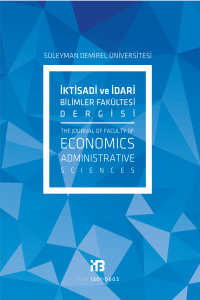BİLGİ YÖNETİMİNDE LİDERLİĞİN ROLÜ ÜZERİNE KAVRAMSAL BİR İNCELEME
Bilgi Yönetimi, Bilgi Yönetimi ve Liderlik, Bilgi Yönetiminde Liderlik Rolleri
Bilgi Yönetiminde Liderliğin Rolü Üzerine Kavramsal Bir İnceleme
-,
___
- 1. “Organizasyonel Bilgiye Sahip Çıkmak”, İnsan Kaynakları Web Sitesi, Nisan, 2001, http://www.insankaynaklari.com/cn/ContentPrint.asp? BodyID=305.
- 2. ALLERTON, H.E., “News You Can Use”, Training & Development, C.52, S.2, 1998, 9-10.
- 3. ANDRE, John, “Chief Knowledge Officer”, Knowledge Management Working Group_KM.GOV, 2003, http://www.km.gov/QuickPlace/km/ PageLibrary85256C6B005EDD06.nsf/7A67D139B238F48C85256C7E00 6AA3AF/AA565305CD6E4A9385256D5000521948/?OpenDocument (18.02.2006).
- 4. BAJARIA, H. J., “Knowledge Creation and Management: Inseparable Twins”, Total Quality Management, Abingdon: July, C.11, S.4-6, 2000, 562-573.
- 5. BARUTÇUGİL, İsmet, Bilgi Yönetimi, Kariyer Yayınları, Yayın No:24, 2. Baskı, İstanbul, 2002.
- 6. BHATT, Ganesh D., “Knowledge Management in Organizations: Examining the Interaction between Technologies, Techniques, and People”, Journal of Knowledge Management, C.5, S.1 2001, 68-75.
- 7. BHATT, Ganesh D., “Management Strategies for Individual Knowledge and Organizational Knowledge”, Journal of Knowledge Management, C.6, S.1, 2002, 31-39.
- 8. BOLLINGER, Audrey S. ve SMITH, R. D., “Managing Organizational Knowledge as a Strategic Asset”, Journal of Knowledge Management, C.5, S.1, 2001, 8-18.
- 9. BONNER, Dede, “Enter the Chief Knowledge Officer”, Training and Development, C.54, S.2, 2000, 36-40.
- 10. CAPSHAW, Stacie ve KOULOPOULOS, Thomas M., “Knowledge Leadership”, DM Review, May, 1999, http://www.dmreview.com/ article_sub.cfm?articleId=20.
- 11. ÇİVİ, Emin, “Knowledge Management as a Competitive Asset: a Review”, Marketing Intelligence & Planning, C.18, S.4, 2000.
- 12. DFOUNI, Mark ve CROTEAU, Anne-Marie, “Knowledge Management Technological Issues, Roles and Obstacles: An International Web-Based Delphi Study”, The Concordia University Department of Decision Sciences and MIS, John Molson School of Business, Quebec, Canada, 2003.
- 13. DFOUNI, Mark, “Knowledge Leader’s Critical Issues: An International Delphi Study”, Concordia University, Aralık, Yayınlanmamış Yüksek Lisans Tezi, 2002.
- 14. DZINKOWSKI, Ramona, “The Value of Intellectual Capital”, The Journal of Business Strategy, C.21, S.4, 2000.
- 15. EDVINSSON, Leif ve MALONE, Michael S., Intellectual Capital: Realizing Your Company’s True Value by Finding Its Hidden Brain Power, Harper Business, New York, 1997.
- 16. FLASH, Cynthia, “Who is the CKO?” Knowledge Management Magazine, 2001, http://www.destinationkm.com (08.02.2006).
- 17. GUNS, Bob, “The Chief Knowledge Officer’s Role: Challenges and Competencies”, Journal of Knowledge Management, C.1, S.4, 1998.
- 18. KESKİN, Halit ve KALKAN, Veli Denizhan, “İşletmelerde Bilgi Yönetiminin Tanımlanması ve Kavramsallaştırılması: Kobi’lerde Bilgi Yönetimi Araçlarının Kullanımına İlişkin Bir Araştırma”, 1. Ulusal Bilgi, Ekonomi ve Yönetim Kongresi, 10-11 Mayıs, Kocaeli, 2002.
- 19. KIM, Seonghee, “The Roles of Knowledge Professionals for Knowledge Management”, INSPEL-International Journal of Special Libraries, C.34, S.1, 2000, 1-8.
- 20. LEE, Ching Chyi ve YANG, Jie, “Knowledge Value Chain”, The Journal of Management Development, C.19, S.9, 2000, 783-793.
- 21. LEGNICK-HALL, Mark ve LEGNICK-HALL, Cynthia A., Bilgi Ekonomisinde İnsan Kaynakları Yönetimi, (Çev: Günhan GÜNAY), Dışbank Yayınları, Dışbank Kitapları-7, Kelebek Matbaası, 2004.
- 22. MALHOTRA, Yogesh, “Knowledge Management for E-Business Performance: Advancing Information Strategy to Internet Time”, Information Strategy, the Executive’s Journal, C.16, S.4, 2000, 5-16.
- 23. MÅRTENSSON, Maria, “A Critical Review of Knowledge Management as a Management Tool”, Journal of Knowledge Management, C.4, S.3, 2000, 204-216.
- 24. MCINERNEY, Claire, “Hot Topics: Knowledge Management-A Practice Still Defining Itself”, Bulletin of the American Society for Information Science and Technology, February/March, C.28, S.3, 2002, 14-15.
- 25. MYERS, Mark, “Knowledge Management: How Do You Know What You Know?”, Computer Technology Review, Los Angeles, April, C.21, S.4, 2001.
- 26. OXBROW, Nigel, “Knowledge Management in the Public Sector”, TFPL’s First CKO Summit for the Public Sector Executive Report, April, Bath Priory, Bath, UK, 2002.
- 27. OXBROW, Nigel, “Knowledge Strategies in Action”, TFPL’s Third International CKO Summit Executive Report, October, Luttrellstown Castle, Dublin, Ireland, 2000.
- 28. OXBROW, Nigel, ABELL, Angela ve WARD, Sandra, “KM in Practice 50 Years of Experience”, The Second International CKO Summit Executive Report, March, Luttrellstown, Castle Dublin, Ireland, 1999.
- 29. PAN, Shan L. ve SCARBROUGH, Harry, “Knowledge Management in Practice: An Exploratory Case Study”, Technology Analysis and Strategic Management, C.11, S.3, 1999, 359-374.
- 30. Peter COOK, “I Heard It through the Grapevine: Making Knowledge Management Work by Learning to Share Knowledge, Skills and Experience”, Creativity Unleashed Web Sitesi, 2005, http://www.cul.co.uk/creative/grapevine.htm.
- 31. PRUSAK, Laurance, “Where Did Knowledge Management Come From?”, IBM Systems Journal, C.40, S.4, 2001.
- 32. STONEHOUSE, George H. ve PEMBERTON, Jonathan D., “Learning and Knowledge Management in the Intelligent Organization”, Participation and Empowerment, C.7, S.5, 1999.
- 33. ŞAMİLOĞLU, Famil, Entelektüel Sermaye, Gazi Kitabevi, Ankara, 2002.
- 34. TÜRK, Murat, Küreselleşme Sürecinde İşletmelerde Bilgi Yönetimi, Türkmen Kitabevi, Yayın No: 235, İstanbul, 2003.
- 35. VIITALA, Riitta, “Towards Knowledge Leadership”, Leadership and Organization Development Journal, C.25, S.6, 2000, 528-544.
- 36. WIIG, Karl M., “Knowledge Management: An Introduction and Perspective”, The Journal of Knowledge Management, September, C.1, S.1, 1997, 6-14.
- 37. YENİÇERİ, Özcan, “Örgütleri Etkinleştirme Aracı Olarak Bilgi ve Bilgi Yönetimi”, 2023 Dergisi, Sayı 20, Aralık, 2002.
- ISSN: 1301-0603
- Yayın Aralığı: Yılda 3 Sayı
- Başlangıç: 1996
- Yayıncı: Süleyman Demirel Üniversitesi
BİLGİ YÖNETİMİNDE LİDERLİĞİN ROLÜ ÜZERİNE KAVRAMSAL BİR İNCELEME
Doç.Dr.Selen DOĞAN, Arş.Gör.Selçuk KILIÇ
ÇEVRESEL RAPORLAMA REHBERLERİ VE İŞLETME ÇEVRESEL RAPORLARINDA AÇIKLANMASI GEREKEN BİLGİLER
BİLGİ VE TEKNOLOJİ DEĞİŞKENLERİNİN TİCARET HADLERİ ÜZERİNE ETKİSİ
Dr.Ali ŞEN, Dr.Fatih ÇELEBİOĞLU, Dr.Hüseyin ALTAY
MUHASEBE SKANDALLARINDAN KÜRESEL KRİZLERE
Asst.Prof.Dr.Cengiz YILMAZ, Assoc.Prof.Dr.Cemal ELİTAŞ, Assoc.Prof.Dr.Mehmet ERKAN
Yrd.Doç.Dr. H. Ali ATA, Yrd.Doç.Dr. İbrahim H. SEYREK
OTEL İŞLETMELERİNDE YÖNETSEL ETKİNLİK VE 4-5 YILDIZLI OTEL İŞLETMELERİNDE BİR UYGULAMA
FİRMA BÜYÜME PERFORMANSINI ETKİLEYEN FAKTÖRLER
Doç.Dr. Murat KARAÖZ, Yrd.Doç.Dr.Hakan DEMİRGİL
ANKARA İÇİN OPTİMAL HASTANE YERİ SEÇİMİNİN ANALİTİK HİYERARŞİ SÜRECİ İLE MODELLENMESİ
